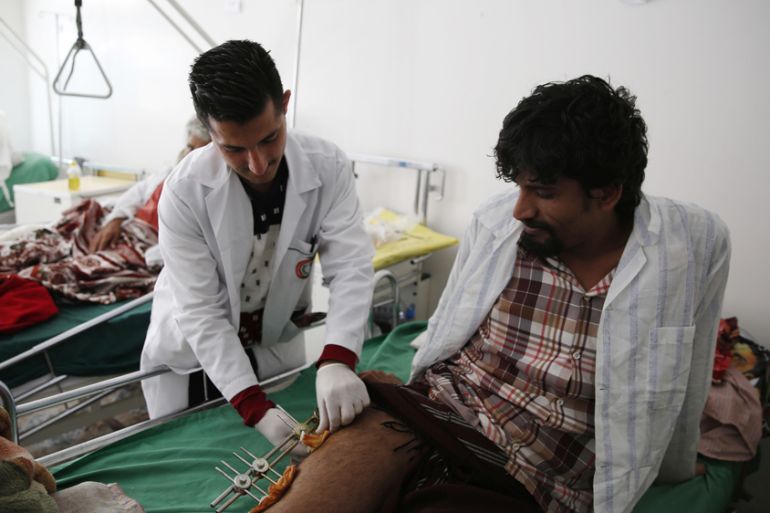Yemen’s healthcare system confronts mounting burden
Hundreds of healthcare facilities in the war-torn country have been rendered nonfunctional, as casualty numbers rise.

Doha – As the war in Yemen nears its first anniversary, the state of healthcare in the country has never been more precarious, doctors say.
More than 6,000 people, about half of whom were civilians, have been killed since the start of Saudi-led coalition air strikes against Houthi rebels in March 2015, according to the United Nations. More than 21 million people are in need of humanitarian assistance, while the World Health Organization has warned that Yemen’s healthcare system is “on the brink of collapse”.
Keep reading
list of 4 itemsSouth Africa’s Ramaphosa signs health bill weeks before election
Gaza lost much more than a hospital when it lost al-Shifa
With measles on the rise, rebuilding trust in vaccines is a must
Tariq Noman, a cardiovascular surgeon based in Yemen who spoke at the Yemen Humanitarian Crisis Conference in Qatar last month, said that the current situation is “disastrous”.
“Houthi militias have been attacking hospitals, ambulances and medical staff directly. Hospitals in Taiz have come under shelling from Houthis almost on a daily basis,” Noman told Al Jazeera. “But what can we do? We have to go to work and do our job.”
READ MORE: Newborns dying amid siege of Yemeni city
Noman said that his job entails treating patients with multiple bullet wounds, broken bones and vascular injuries.
“We receive every type of trauma injury you could imagine, and we try our best to save as many lives as we can and minimise disabilities with basic resources and depleting medical supplies … We have treated some [Houthis] who had been caught by the resistance forces. We don’t discriminate, as our work is humanitarian.”
There are thousands of children going unvaccinated, terminally ill patients not being able to receive regular treatments, and pregnant women missing out on crucial check-ups.
Noman, who set up a field hospital to treat injured protesters during Yemen’s 2011 uprising, noted that health services in Yemen were never “up to the standard” due to chronic neglect by the regime of former President Ali Abdullah Saleh – but the war has made matters dramatically worse.
Since last February, Noman has been working at a government hospital in Taiz, which has been under siege by Houthi rebels.
According to the UN, 600 health facilities have been deemed nonfunctional due to conflict-related damages or shortages of staff and supplies. Delivery of healthcare in the country has become more challenging than ever before, Pranav Shetty, a health coordinator with the International Medical Corps, told Al Jazeera.
“We have been trying to deliver supplies in places like Taiz and Aden, but the unpredictable nature of the conflict has been a major hurdle for all aid agencies and international organisations operating in Yemen,” Shetty said, noting that the process of negotiations with the different groups controlling various areas of the country presents a logistical nightmare for aid workers.
Even when aid supplies make it in to besieged areas like Taiz, Shetty said, they do not always reach the intended recipients – or they arrive too late, after critical medicines have expired. Hospitals also lack the necessary equipment to operate on the growing number of wounded, with 27,000 people reported injured in Yemen since October 2015.
“The biggest surgery in a normal situation is nothing compared to war trauma, which means that a person can have injuries in the chest, abdomen, bones, all at the same time,” Noman said. “Facilities – like properly functioning labs, ICUs, dialysis units – are either missing or in a dilapidated state.”
READ MORE: Starvation in Yemen – ‘We are hoping just to survive’
To cope with the increasing needs, hospital staff have trained local volunteers and medical students in basic emergency response. When doctors receive monetary donations, they share the funds with the volunteers.
“Everybody is poor in Yemen. They don’t have food. We try to help them with food and rations,” Noman said. “Nobody is eating well in Yemen.”

According to the United Nations Office for the Coordination of Humanitarian Affairs, while around 14 million Yemenis are in need of access to healthcare, patient consultations at the country’s health facilities have decreased by approximately 20 percent since the conflict began.
The long-term effects of the war will only start to become prominent after the conflict ends, Shetty said.
“There are thousands of children going unvaccinated, terminally ill patients not being able to receive regular treatments, and pregnant women missing out on crucial check-ups,” he said. “All of this will add up and become a burden on Yemen’s already weakened healthcare system.”
Follow Hafsa on Twitter: @hafsa_adil